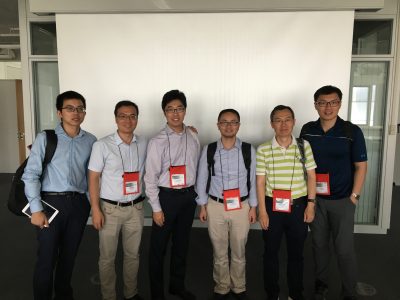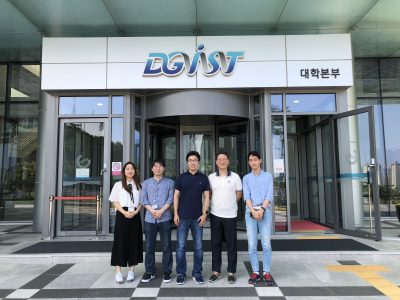Mengzhuo yang defended her master thesis successfully today. Congratulations!
Wish Mengzhuo all the best in the future.

Mengzhuo yang defended her master thesis successfully today. Congratulations!
Wish Mengzhuo all the best in the future.

Yishu Bai, Jiachen Tu and Mengzhuo Yang submitted their first journal paper to IISE Transactions for consideration of publication. The paper is on a new improvement aggregation for performance metric calculation in serial production lines with exponential machines. Congratulations! Hope the review process is smooth and constructive. Good luck!
Welcome.
Professor Liang Zhang attended the 14th annual IEEE International Conference on Automation Science and Engineering (IEEE CASE 2018) in Munich, Germany, August 20 to 24, 2018. He presented the paper “Transients of Synchronous Serial Production Lines with Non-Exponential Reliability Machines” co-authored by Mengzhuo Yang, Liang Zhang and Peter Denno.

Professor Liang Zhang visited DGIST, South Korea, from July 12 to July 20. He gave two seminars, “Production Systems Engineering in Action: Case Studies and Applications” and “New Advances in Production Systems Engineering: Transient Performance Analysis” and collaborated with faculty and students in theoretical research and industrial applications.

Weiji Han successfully defended his PhD thesis “System Modeling, Performance Evaluation, and Control of Battery System Charge Balance” on Apr. 25 and has recently accepted a post-doc job offer from Chalmers University of Technology, Gothenburg, Sweden, to continue his research in the area of battery systems. Congratulations, Dr. Han!
Production Systems Engineering (PSE) is an emerging area of Engineering intended to provide quantitative analytical methods for analysis, continuous improvement, and design of production systems. Every problem has its origin on the factory floor. Every solution obtained in PSE has been applied on the factory floor. PSE uses traditional terms, such as bottleneck, leanness, continuous improvement, etc., but infuses them with precise engineering knowledge and, thereby, offers a possibility of designing and managing production systems with the highest efficiency and guaranteed performance.
The approach of PSE is based on mathematical modeling of serial lines and assembly systems, with subsequent analyses based on recursive aggregation procedures. As a result, methods for solving the following problems are derived: Performance analysis; Bottleneck identification; Continuous improvement; Lean buffering design; Product quality; Raw material release control to ensure desired lead time. To enable applications, the PSE Toolbox, which implements the algorithms obtained in PSE, has been developed.
PSE has been applied to dozens of production systems in large, medium, and small manufacturing organizations. These include GM, Ford, Chrysler, Toyota, MillerCoors, Kraft Foods, Kroger, Lexmark, Subzero, Ruud Lighting, HellermannTyton, etc. Consistently, significant improvements in productivity, quality, and customer demand satisfaction have been obtained.